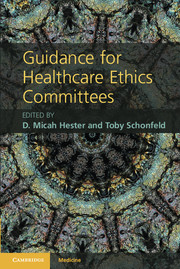Book contents
- Frontmatter
- Contents
- Contributors
- Preface
- Section 1 The Context of Healthcare Ethics Committee Work
- Section 2 Consultation
- 5 Mission, vision, goals: defining the parameters of ethics consultation
- 6 Ethics consultation process
- 7 Informed consent, shared decision-making, and the ethics committee
- 8 Decision-making capacity
- 9 Family dynamics and surrogate decision-making
- 10 Confidentiality
- 11 Advance care planning and end-of-life decision-making
- 12 Medical futility
- 13 Ethical issues in reproduction
- 14 Ethical issues in neonatology
- 15 Ethical issues in pediatrics
- Section 3 Policy Development and Organizational Issues
- Section 4 Educating Others
- Index
- References
15 - Ethical issues in pediatrics
Published online by Cambridge University Press: 05 August 2012
- Frontmatter
- Contents
- Contributors
- Preface
- Section 1 The Context of Healthcare Ethics Committee Work
- Section 2 Consultation
- 5 Mission, vision, goals: defining the parameters of ethics consultation
- 6 Ethics consultation process
- 7 Informed consent, shared decision-making, and the ethics committee
- 8 Decision-making capacity
- 9 Family dynamics and surrogate decision-making
- 10 Confidentiality
- 11 Advance care planning and end-of-life decision-making
- 12 Medical futility
- 13 Ethical issues in reproduction
- 14 Ethical issues in neonatology
- 15 Ethical issues in pediatrics
- Section 3 Policy Development and Organizational Issues
- Section 4 Educating Others
- Index
- References
Summary
Objectives
Identify ethical difficulties in the role of parental decision-making.
Discuss pediatric assent and the ability to consent for themselves.
Recognize the diiculty with applying the “best interest” standard for some children.
Case 1
Tommy, 3, sustained a traumatic brain injury (TBI) from a motor vehicle accident. Two weeks into his ICU stay, physicians presented Tommy’s parents with the option to forgo life-sustaining treatments (FLST). After a few days of reflecting and discussing the issue, they agreed that stopping the ventilator was best, but by that time there was a new ICU physician who, after review of Tommy’s condition, did not think that FLST was warranted. With more intensive therapy, Tommy was able to breathe without the vent, and he was moved to the rehabilitation unit. Because of his TBI, however, he continued to be fed through a tube. Neurological scans indicated problems with the basal ganglia, and Tommy’s parents suggested that Tommy’s condition was not in his best interest and asked the palliative care physician about the possibility of stopping feeds. At the same time, the physical and occupational therapists working with Tommy, as well as nurses and social workers from the PICU who came to visit him in rehab, believed they saw slight but noticeable improvements in his cognitive status – possibly tracking, smiling, and reacting to some stimuli. The entire unit, as well as these PICU staff members, is concerned about the ethics of what the parents are suggesting.
- Type
- Chapter
- Information
- Guidance for Healthcare Ethics Committees , pp. 114 - 121Publisher: Cambridge University PressPrint publication year: 2012
References
- 8
- Cited by



